#verdi. my beloveds. my good time boys.
Text


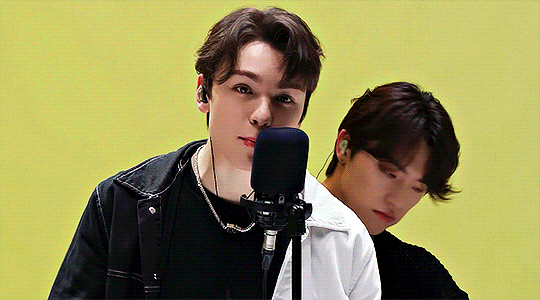
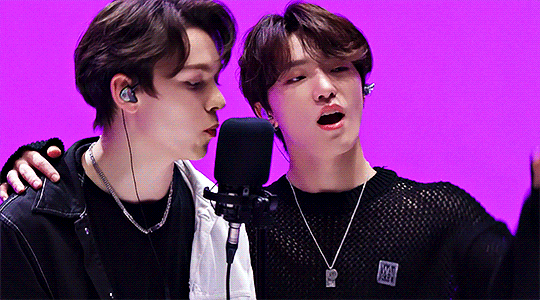

VERNON && DINO
@ dingo killing voice.
#vernon#dino#vernon gifs#dino gifs#choi hansol#vernon chwe#lee chan#seventeen#svt#seventeen gifs#svt gifs#*mine#my gif#svt killing voice#verdi. my beloveds. my good time boys.#having these two share a mic was a beautiful beautiful thing#AND RJ IF YOU'RE READING THESE TAGS HOW DID U GET INSIDE MY BRAIN#'all the verdi interactions<3333' ON THE OTHER POST lmao BYE#HOW DID YOU KNOW I WAS DOING THIS AT THE SAME TIME. I'VE GOT QUESTIONS 😭😭😭😭😭#consider this a gift. to u#looooool sorry that was just. so funny. to me. i'm finished yelling now i swear#the way they just. constantly. look so proud of each other. THE ENTIRE TIME.#stop the world i want to get OFF i can't handle them n e more <3
226 notes
·
View notes
Text
Va, Tosca!
I’ve been fascinated by ‘Tosca’ since three years ago, when I first heard it in Kiev opera. What motivated me to dig deeper was the stubborn anti-Puccini bias of music critics that started with the opera’s (nay, it's antecedent play’s) premiere and didn’t really cease by this day. Which I cannot understand at all: ‘Tosca’ is literally one of the most popular operas in the world, outperformed only by such eminent names as Verdi’s ‘La Traviata’, Mozart’s ‘Die Zauberflöte’, Puccini’s own ‘La Boheme’ and Bizet’s ‘Carmen’. So what gives?
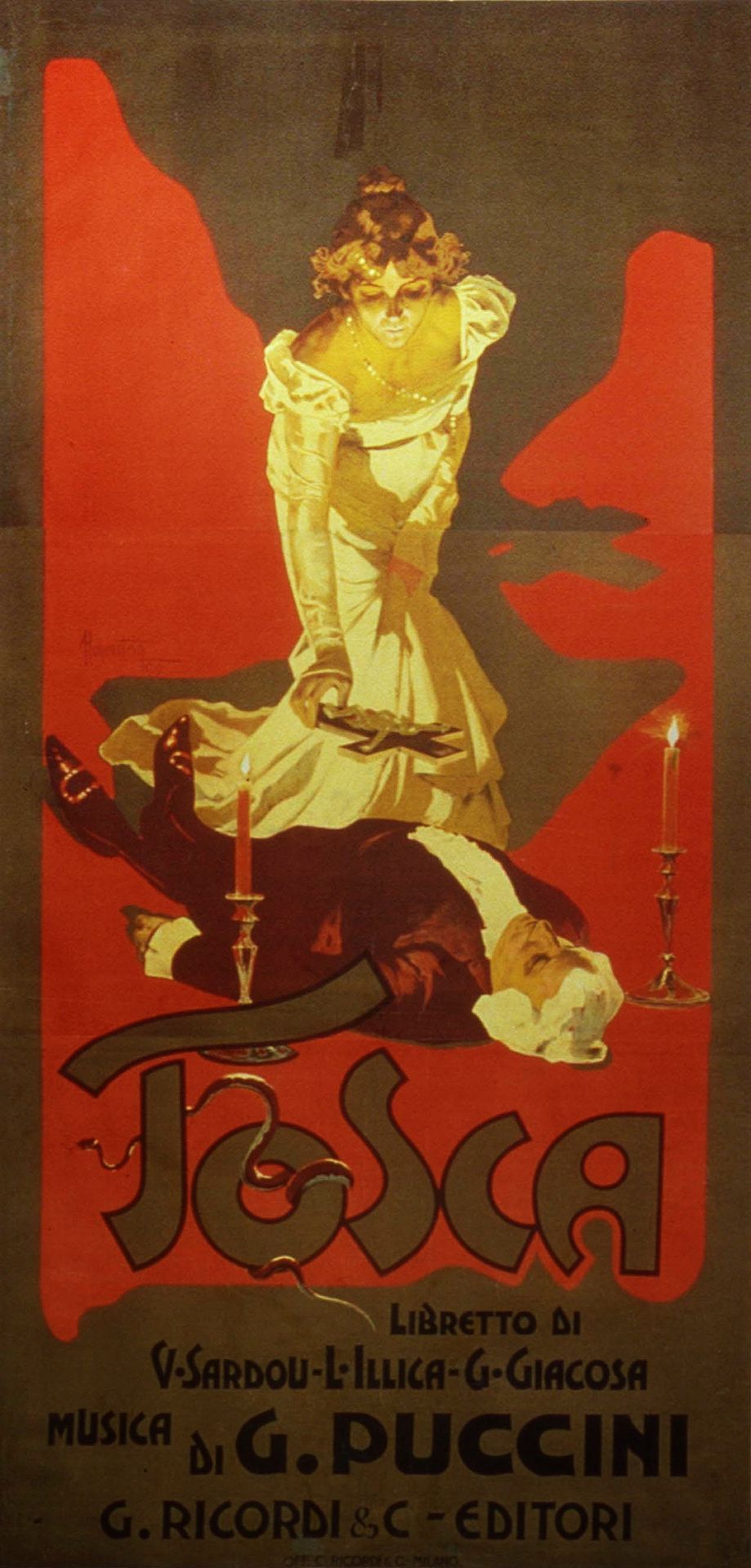
‘Tosca’, original poster, 1899
The premise of this 3-act opera by Giacomo Puccini is rather simple: a villain wants a girl who loves a boy who loves her back and also helps revolutionaries. And also it’s a tragedy, like in a Shakespearean Everybody Dies kind of tragedy. You can pretty much guess the plot from there.
What I personally like about this opera is the combination of lightning-fast plot (the action takes place within several hours on June 17-18, 1800), finely developed character portraits, and music that explains and foreshadows everything you need to know.
Naturally, I don’t take the vague criticisms of ‘Tosca’ all that well.
Ha più forte sapore [bits of history and background]
Puccini’s opera is based on a 1887 5-act play ‘La Tosca’ by Victorien Sardou.
Puccini had seen La Tosca at least twice, in Milan and Turin. On 7 May 1889 he wrote to his publisher, Giulio Ricordi, begging him to get Sardou’s permission for the work to be made into an opera: ‘I see in this Tosca the opera I need, with no overblown proportions, no elaborate spectacle, nor will it call for the usual excessive amount of music.’
M.J. Philips-Matz ‘Puccini: A Biography’
I found this quote, and it instantly clicked: it’s exactly why I like ‘Tosca’.
In contrast to Sardou’s initial work, Puccini’s opera is much more succinct and direct. It has almost zero overblown dialogues and soliloquies that don’t promote the plot or develop characters (well, maybe there is this one lyric soprano-tenor duetto ‘Amaro sol per te m’era il morire’ [‘Only for you did death taste bitter for me’] in act III that’s a bit too long for my taste, but even this slow moment is essential because it gives the audience an opportunity to breathe as the final shockwave looms closer). But the rest of it is actually interesting to see and hear.
For me, ‘Tosca’ is one of the very few operas that are targeted at people who are not fifteen and overly dramatic adult audiences who don’t need same things repeated at them all the time and who can catch what is happening without seeing each and every small detail. Puccini squeezed Sardou’s acts II, III and IV into a single second act, and it works. We as an audience don’t need to see the whole scene at Cavaradossi’s house to understand what happened there. We can use our imagination to paint the rest of the picture.
Looks like the critics do not agree with me on this one.
Perché, perché, Signore [criticisms galore]
The infuriating part about the critical landscape of ‘Tosca’ is that the critics don’t seem to agree on a single point of reproof. Some complain that the opera is too wordy; others, conversely, are not satisfied with the plot rushness (the view that both librettists of ‘Tosca’, Illica and Giacosa shared). Critics called the opera ‘three hours of noise’ that lacks style and cohesion. Julian Budden [opera scholar] faulted the ‘inept handling of the political element’ while commending ‘a triumph of pure theatre’. Burton Fisher [opera writer] described the sensuous love duet ‘Qual’occhio’ as ‘an almost erotic lyricism’ and ‘pornophony’.
Is it just me, or do the critics dislike ‘Tosca’ precisely for the nuances I love about it: coherence of the plot, acute and restrained drama, absence of excessive political speculations (it was not meant to be goddamn ‘Les Miserables’) and, well, musical puns? More on that later.
Not to say ‘Tosca’ didn’t receive its share of praise. Charles Osborne [music critic] believed the plot of ‘Tosca’ was taut and effective while the characters had enough opportunities to shine both in terms of dramatic development and musical elaborateness. Some also praised the richness of Puccini’s score:
[Puccini] finds in his palette all colours, all shades; in his hands, the instrumental texture becomes completely supple, the gradations of sonority are innumerable, the blend unfailingly grateful to the ear.
Ippolito Valetta [music critic] ‘Rassegna Musicale’ in ‘Nuova Antologia’
The aspect of criticism that I did find explainable was based on ‘disconcerting vulgarities’ as put by Gabriel Faur�� [composer]. To be honest, the opera really does not lack in violence: Tosca undergoes sexual assault, is broken by the need to defend her chastity with murder and by the death of a beloved, and finally commits suicide. For the public back in 1900 such developments truly could be regarded as a bit too much.
For modern audiences, however, the events are nothing to be shied away from. The opera aged exceedingly well, not losing a bit of its attractiveness in romantic and dramatic sense. Even more so, the criticism that ‘Tosca’ still receives today makes little sense. Joseph Kerman’s [musicologist] remark on ‘Tosca’ as a ‘shabby little shocker’ from the middle of the century, well after the actual real-life shock of two world wars and the brusque shift of public morale, was way off the mark. Thomas Beecham [conductor] bitingly responded that anything Kerman said about Puccini could ‘safely be ignored’ (it almost makes one thing something personal’s involved).
Besides, some modern scholars share my perception of ‘Tosca’s treatment:
Scholarly presses and journals still deeming [Puccini’s] operas too popular to be worthy of serious study continue to shoot themselves in their collective foot.
Deborah Burton ‘Tosca’s Rome: The Play and the Opera in Historical Perspective (review)’
By Burton, Puccini was often simply ‘snubbed by the musicological establishment’. The fun part? Puccini put on his Scarpia persona to cynically and kind of affectionately if you ask me describe ‘Tosca’ as ‘zibaldone’ [‘hodgepodge’]. He referred to it as ‘a vile opera’ and ‘quella putana di Roma’ [‘that Roman whore’]. If this isn’t love.
Già, mi dicon venal [quick glance at the initial play]
Similar criticism of abundance of violence was applied to Sardou’s play. Tosca’s behavior was deemed ‘unchaste’, and the brutality disturbed both critics and theatre fans. Jules Favre [statesman] even called it ‘cette pièce vulgaire, sans intrigue, sans caractères, sans moeurs’ [‘vulgar piece, without intrigue, without characters, without morals’].
The most offensive part of the play was, apparently, Cavaradossi’s torture. Even off-stage, his screams prodded the critics to warn women against seeing ‘La Tosca’ as the play could ‘inflict irreparable injury on persons yet unborn’.
Despite this, the play was an immediate success. It toured around the world, and even the harshest critics couldn’t ignore its dramatic effect:
As to the play itself, I will only add that it is offensive in its morals, corrupt in its teaching, and revolting in its brutality, and yet everyone who admires acting is bound to see it.
Cecil Howard [theatre critic] ‘La Tosca’, ‘The Theatre’
So. Let’s see what threw people in such a dismay, shall we.
Io de’ sospiri [plot and why it’s good]
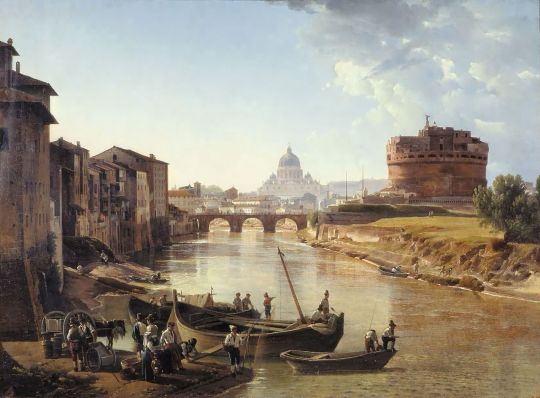
Sylvester Feodosiyevich Shchedrin ‘New Rome. Castel Sant’Angelo’, oil on canvas, 1823
It all starts with Roman ex-consul Angelotti escaping the clutches of tyrannical justice. The fugitive runs into Mario Cavaradossi, painter and Bonapartist who agrees to help him. Two men are interrupted by Mario’s passionate lover and Roman opera celebrity, Floria Tosca. After a fit of jealousy she leaves the church, and Cavaradossi leads Angelotti away from the city to hide in his villa. Right afterwards, Baron Scarpia, chief of police and the embodiment of tyranny emerges on stage and, when Tosca returns, devises to use her jealousy to lead him to Mario and Angelotti.
Second act is all about torturing Cavaradossi (off-stage) and Tosca’s gradual breakdown. Scarpia demands the location of Angelotti, which she surrenders to save Mario from suffering. Then Scarpia tries to force Tosca to give herself to him, which she agrees in exchange for her lover’s life - only to stab unsuspecting Scarpia with a knife.
The rest of the main cast dies during the third act. Mario’s ‘staged’ execution appears to be not so fake as Scarpia promised. Tosca, inconsolable and heartbroken, jumps to her death as the soldiers, who discovered Scarpia’s body, corner her on the ramparts of Castel Sant’Angelo.
The plot pretty much follows Sardou’s play, although the action was tightened (mostly by avoiding obvious plot turns) and the list of characters sharply compressed.
Sardou’s act III features a scene that is not present in Puccini’s opera: Cavaradossi’s villa, the painter, Angelotti, and later Tosca and Scarpia. One of the things I liked about the opera is that it doesn’t have this scene. It’s excessive and basically tells nothing that audience couldn’t have picked up from the unobtrusive operatic dialogue in act II. Puccini - Sardou 1:0.
Obviously, Mario’s execution was not fake. In the play, Spoletta reveals this fact to Tosca. In the opera, he at first misunderstands Scarpia’s order (hilariously so, as he nearly confesses the whole thing to Tosca), which allows the audience to guess their scheme. 2:0 for subtlety.
In act II, Scarpia questions Mario with the backdrop of Tosca’s cantata performance off-stage, in the depths of Palazzo Farnese. 3:0, this whole piece is just gorgeous.
Puccini wanted ‘La Tosca’s plot stripped of everything excessive (which is, lamentably, a rare practice for operatic genre):
[Puccini] cut Tosca to the bone, leaving three strong characters trapped in an airless, violent, tightly wound melodrama that had little room for lyricism.
M.J. Philips-Matz ‘Puccini: A Biography’
Ignoring criticisms, Puccini also persevered in his clear vision of how the ending should be - by the way, nearly the single thing he and Sardou agreed upon. A good thing undoubtedly; I’d hate for this to happen:
Puccini’s librettists also disliked the suicide, and an alternate ending for the opera was (briefly) considered: rather than leap, Tosca would go mad, collapse, and die on the body of her lover (presumably of Sudden Operatic Death Syndrome).
Susan Vandiver Nicassio ‘Ten Things You Didn’t Know about Tosca’
Pure gold of a remark. Thank you, Susan.
‘Tosca’ is a very tight, succinct work, beautifully paced. I like how the acts are structured and developed. Act I, the longest one, was clearly meant to be expositional. Also, it’s the melodramatic one, with inclusion of comedic motifs that significantly lighten the mood (think the character of the Sacristan and continuous good-hearted mocking of Tosca by her lover).
Act II is unexpectedly macabre: there’s not a trace of the lightheartedness of act I. A real drama ensues, with torture, violence and grim ending (Tosca murders Scarpia in cold blood, which I, as a cynic, viciously enjoy every time). This act is also shorter while it still has enough room for Scarpia’s intricate manipulation and blooming deconstruction of Tosca. The characters are well-developed and nicely motivated (at least in part Sardou’s merit).
Act III is the shortest (just over 20 minutes), and it’s a full-on tragedy. The final plot twist was hardly intended as one. This act is an emotional roller-coaster. Combining hope and death, it is based on fragmented pieces, which makes the whole thing feel real, not operatic. The opera ends strong and loud, and it’s perfect that way. The audience is left with the sense of tragedy that is not undermined by unnecessary lyricism of long pre-death arias (like in Verdi’s ‘La Traviata’, I absolutely hate the last act). With the rush of events, the delay at this point would be unendurable.
‘Tosca’ is chaotic in its final scene, just as it should be. Tosca the character makes the (suicide) decision in a blink of an eye, and I absolutely love the impression that she makes it out of egotistical motives: she is to be captured by the soldiers - not because Mario is dead. This is the kind of nuance that defines the difference between real living people and operatic character embryos. When the opera ends, I always find myself speechless and anguished not irritated at how annoyingly long it takes for the characters to die (looking at you, Verdi).
E lucevan le stelle [characters breakdown]

Palazzo Farnese, 2018. Now French Embassy in Rome
First and strongest impression about the characters of ‘Tosca’: gosh, they are not dumb! So it is possible.
One of the major appeals of ‘Tosca’ is that the characters feel like real people instead of archetypal damsel in distress, knight in shining armor and flat cardboard villain. Although Scarpia bends a bit in that direction, being completely satisfied with his villainous villainy, he acknowledges it, giving off the air of a ‘connoisseur of evil’ instead. William Ashbrook [musicologist] recognized Puccini as a portraitist who honed lifelike characters. Even the smaller characters like the Sacristan (‘an avaricious hypocrite’), Angelotti (exhausted but proud-spirited escapee) and Spoletta (when Scarpia says ‘jump’ he asks how high a perfect minion) are miniature studies of human nature. ‘Tosca’, in his opinion, is a portrait gallery of real-life people.
Floria Tosca [soprano]
For some unfathomable reason, ‘Tosca’ is defined as a melodrama, which is totally different from how it feels with its darkness and the fact that everybody of significance dies in the end. Wiki says melodrama is ‘a dramatic work in which the plot, which is typically sensational and designed to appeal strongly to the emotions’ - basically, plot over characters. Instead, [scenic] tragedy (defined by Google) is ‘a play dealing with tragic events and having an unhappy ending, especially one concerning the downfall of the main character’.
The latter is literally the plot of ‘Tosca’, especially as the title character undergoes a whole set of the most traumatic experiences (concessions to conscience, attempted rape, murder in defense, witnessing torture and execution of a loved one) in a span of just several hours. This set of experiences naturally draws a basis for her downfall (literally): under stress and with no opportunity to think thoroughly, it is not surprising that Tosca commits suicide.
She is strong-willed and passionate, pure-hearted (which is probably why she doesn’t see through Scarpia’s schemes) but not stupid, loyal but also jealous. More out of habit, if we to believe Julian Budden [opera scholar]:
[Cavaradossi, act I, scene 5]
Mia gelosa!
[My jealous [Tosca]!]
[Tosca]
Si, lo sento, ti tormento,
senza posa.
[Yes, I feel it, I torment you
unceasingly.]
All in all, she is a harmonious character in dire circumstances, and it’s a true delight to observe how Tosca, despite how broken and devastated she is, finds the power to oppose her offender. This is the real plot twist (character twist?) of the opera - and I assume the reason that ‘Vissi d’arte’, Tosca’s major aria (an emotional plea of a character who is about to betray her very self) is so well-known and recognized.
Mario Cavaradossi [tenor]
In comparison with Tosca, Cavaradossi is a deceptive character. At first glance he might appear rather flat: nothing more than a loyal lover and a proud revolutionary. Upon closer inspection, however, the audience discovers liveliness and realism many male operatic characters severely lack: he jokes with Tosca instead of oh-so-common sickeningly sweet sighs of love. He knows her flaw of being prone to jealousy - but doesn’t take it too close to heart. He listens to her without interruption as she tells him about Scarpia’s advances (for sure, I was waiting for a hateful scene where he would scream ‘how could you’ at his lover and bang his head against a wall). And he actually knows how to appreciate that she willingly sacrificed her purity for his sake (and he sings an aria about it, too: ‘O dolci mani’ [‘Oh, sweet hands’]).
Besides the believable romance with Tosca, Cavaradossi has excellent dynamics with Scarpia. As the news of Napoleon’s victory arrive, Mario - once tortured - cannot resist the urge to relish in how stars turned for his nemesis:
[Cavaradossi, act II, scene 4]
Vittoria! Vittoria!
L’alba vindice appar
che fa gli empi tremar!
Libertà sorge,
crollan tirannidi!
[Victory! Victory!
The avenging dawn now rises
to make the wicked tremble!
And liberty returns,
the scourge of tyrants!]
Tosca tries to stop his prideful speech, aware of how this flows right into Scarpia’s intention to lock revolutionary Cavaradossi up. But Mario is lost in his surging emotions and forgets both himself and his lover at this moment - truly a detail each of us can relate to.
And also Cavaradossi seems to know that his death is not going to be faked - a twist that no one but pure-hearted Tosca is fooled by. He doesn’t believe in Scarpia’s generosity for a moment, and so he doesn’t even try to pretend he is surprised but ironically ridicules the mere idea of a magnanimous villain:
[Cavaradossi, act III, scene 3]
Scarpia che cede? La prima
sua grazia è questa…
[Scarpia yields? This is his first
act of clemency…]
Unbelieving but relieved by Tosca’s appearance and intoxicated by her hopeful rambling, Mario chooses to spend his last moments languishing in her presence: he doesn’t want to spoil this time for neither of them. Beniamino Gigli [opera singer, performed as Cavaradossi] wrote in his autobiography that ‘[Mario] is certain that these are their last moments together on earth, and that he is about to die’.
This interpretation of the character is common among the opera singers:
Unlike Floria, Cavaradossi knows that Scarpia never yields, though he pretends to believe in order to delay the pain for Tosca.
Tito Gobbi [opera singer and director]
However, instead of displaying understandable despair, Cavaradossi falls back to his original optimistic self and starts to subtly mock Tosca’s attempts to teach him how to die theatrically. She replies with ‘non ridere’ [‘you mustn’t laugh’], and he softly reassures her. They’re just so sweet together without the usual operatic mawkishness.
(I suspect Tosca is not entirely convinced of their unscathed escape from the clutches of now-dead Scarpia, as well. No wonder she feels uncomfortable at the prolonged preparations.)
Baron Scarpia [baritone]
The villain of this story was actually the first among the main cast to catch my attention. Scarpia is just so explicitly entertaining in his sardonic wickedness. Still, I can see how he could be interpreted as the least 3-dimensional of the three.
Scarpia is a clever interrogator and a talented manipulator. He knows where to hit and when to push to get the answers he needs. Pressing Tosca more and more, he breaks through her defenses until she is frustrated and annoyed to the point of losing her self-control:
[Scarpia, act II, scene 4]
L’Attavanti non era dunque alla villa?
[So, the Attavanti was not at the villa?]
[Tosca]
No, egli era solo.
[No, he was alone.]
[Scarpia]
Solo? Ne siete ben sicura?
[Alone? Are you quite sure?]
[Tosca]
Nulla sfugge ai gelosi. Solo! Solo!
[Nothing escapes a jealous eye. Alone. Alone!]
[Scarpia]
Davver?
[Indeed!]
[Tosca]
Solo, sì!
[Yes. Alone!]
[Scarpia]
Quanto fuoco! Par che abbiate paura di tradirvi.
[You protest too much! Perhaps you fear you may betray yourself.]
Tosca, with her passionate, fiery temperament, explodes - Scarpia knows about this peculiarity all too well and is able to use her outburst as a clue in his investigation. He continues the pressure all through act II: Mario is tortured, and Tosca is forced to listen to his agony. She eventually crumbles, unable to persevere in keeping Mario’s secret:
[Tosca, act II, scene 4]
Nel pozzo… nel giardino…
[In the well… in the garden…]
This confession is so succinct, just like the rest of the dialogue in this opera. Tosca doesn’t say ‘wait, I’ll tell you everything’, doesn’t try to play for time; she just betrays the whole thing in two short phrases, without specifying what she means. There’s no need: they’re on the same page.
And then Scarpia goes one step beyond and acknowledges his villainous ways, which isn’t necessarily a bad thing but makes him a bit more caricature. Delightfully so, but still. While Tosca nurtures released Cavaradossi to conscience, Baron cunningly waits for the opportune moment, and strikes, ordering Spoletta to bring in Angelotti. He gloats at Cavaradossi, smugness dripping off of him: see, she betrayed your trust! Mario, tortured, exhausted, half-conscious, falls for it, throwing Tosca’s hands away:
[Scarpia, act II, scene 4]
Nel pozzo…
del giardino.
Va, Spoletta.
[In the well…
In the garden.
Get him, Spoletta.]
[Cavaradossi]
Ah! M’hai tradito!
[Ah, you have betrayed me!]
Cavaradossi picks this up from the dialogue between Scarpia and Spoletta - again, no one clarifies anything. Like you do in real life. Subtlety y’all.
Now that the villain has Cavaradossi locked up and preparations for his execution in progress, he is one step away from getting what he wanted from the start. Tosca consents to sleep with him but still cannot conceal her hatred, unavoidable ‘you can have my body but not my heart’ trope, which doesn’t stop his lust in the least - on the contrary, inflames him more:
[Scarpia, act II, scene 5]
Che importa?
Spasimi d’ira, spasimi d’amore!
[What does it matter?
Spasms of wrath or spasms of passion…]
Naturally, when Scarpia is finally killed by Tosca, the audience is bound to feel satisfaction and not regret. Even Floria, the established virtuous character, has no shame as she recognizes Scarpia as the ultimate threat:
[Tosca, act II, scene 5]
Ti soffoca il sangue?
Muori dannato! Muori! Muori! Muori!
È morto!
Or gli perdono!
E avanti a lui tremava tutta Roma!
[Is your blood choking you?
Die accursed! Die! Die! Die!
He is dead!
And now I pardon him!
All Rome trembled before him!]
But Scarpia is a disillusioned aristocrat rather than a one-dimensional villain. What lets him gain more flesh is his motivations - get rid of the rebels (for power rather than ideological considerations) and get the girl (personal gain), - his backstory and notoriety among the revolutionaries, working relationships with other characters and the fact that he continues to live through his actions (arguably the main theme of the opera). Even when dead, Scarpia continues to serve as a villain of the story: Mario dies, and Tosca shouts her curses at him:
[Tosca, act III, scene 4]
O Scarpia, avanti a Dio!
[Oh, Scarpia, [we meet] before God!]
This gives weight to the character as Baron doesn’t disappear as soon as he dies. His life and death both have consequences. His actions have lasting power - a feature that fictional villains far too commonly neglect.
Even though Scarpia possesses some cartoonish features, he is far from being as simple as Wile E. Coyote. Meep meep.
Vissi d’arte [finally, let’s talk music]

Riccardo Manci ‘Mario Cavaradossi singing ‘E lucevan le stelle’, inspired by the tenor Giancarlo Monsalve’, 2014
William Ashbrook described Puccini’s music as ‘telegraphic’ and ‘highly charged’. The reason behind such an impression is the combination of several major leitmotifs that interact, evolve and explain the story. Fugitive motif, love of Tosca and Mario, Scarpia’s theme, torture motif, Tosca’s theme and Cavaradossi’s farewell to life are used as a patchwork that tells the story. These leitmotifs - what Edward Greenfield [music critic] calls ‘Grand Tune’ concept - are memorable and unique, as well as quite distinct from their musical surroundings:
Puccini does not develop or modify his motifs, nor weave them into the music symphonically, but uses them to refer to characters, objects and ideas, and as reminders within the narrative.
Burton Fisher ‘Tosca: Opera Study Guide and Libretto’
Torture motif is one succinct example of how a single simple melody is used to pump up the mood. It first appears as a foreshadowing with Scarpia’s forming intention as he learns Cavaradossi was taken into custody:
[Scarpia, act II, scene 2]
Meno male!
[Not bad, not bad!]
It grows more and more pronounced as Cavaradossi is questioned - threatening but not quite powerful yet. On the backdrop, Tosca’s cantata also gains volume and solemnity - pure delight mixed with anticipation of terror:
[Scarpia, act II, scene 3]
Questo è luogo di lagrime! Badate!
Or basta! Rispondete!
[Beware! This is a place for tears!
Enough now. Answer me!]
And the theme finally loses its careful insinuative tone and thunders at full volume when Scarpia orders Mario into the torture chamber, right before Tosca’s eyes:
[Scarpia, act II, scene 4]
Mario Cavaradossi,
qual testimone il Giudice vi aspetta.
[Mario Cavaradossi,
the judge awaits your testimony.]
The melody elaborates with Mario’s torture heard from off-stage, reaching its breaking point as Tosca breaks and reveals Angelotti’s hiding. It repeats again after Mario is released - slow and woeful, intertwined with Tosca’s and Mario’s love theme that is now devoid of its previous light hopefulness.
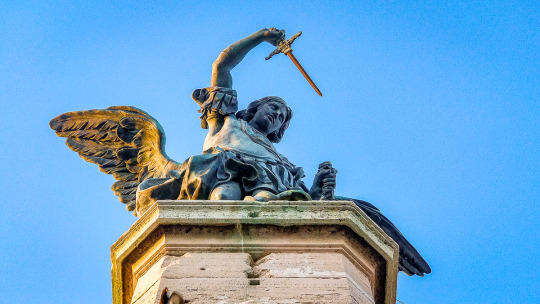
Statue of Michael the Archangel, Castel Sant'Angelo, 2018
I love how music acts as a separate character in the opera. It talks to the characters, responds to them, inquires and leads the conversation. In act I, while Cavaradossi sings about his love to Tosca, the Sacristan reprovingly grumbles about obscene youth on the background. Besides, here lies the great benefit of veristic [realistic] opera that allows the characters to have duologues - Mario and Floria sing their lines separately in a conversational form rather than a boring duet.
Music gives the opportunities of quieter moments, to talk in phrases but also in gestures. During act II, Tosca uses gestures a number of times to answer Scarpia: a nod of the head, a wave; subtle yet expressive. They nearly don’t talk while Scarpia writes her a letter of safe passage. This quiet scene also allows Tosca’s character to unfold, her decision to feel earned. She sees the knife, she hesitates a moment; then she grabs it and hides behind her back: the decision is made. No words necessary; the score allows the characters to be silent while it tells and develops their story.
And it also allows the characters to talk all at once, without listening to each other. By the middle of Act II, as they learn about the battle of Marengo, Mario starts to shout about victory, Tosca tries to shut him up, and Scarpia reels about hanging the revolutionary. They clamor; chaos ensues, and music supports the flurry of eddying noises by playing disparate motifs. The best part about this scene is that it delivers the message loud and clear, on both levels of plot and emotions.
Talking about Puccini’s score, it’s impossible to ignore the musical cohesion and integrity: each of the three main characters has their theme and their own designated aria that allows them to shine. Moreover, as each of their arias happen once per act, I enjoy the interpretation of their dominance: Scarpia in act I, Tosca in act II, Cavaradossi in act III.
Act I. Scarpia’s ‘Te Deum’: lust, menace, church bells
The theme of the villain is played out in contrasts that reflect his character: cunning and smart - but ruthless and just on this side of crazy. Scarpia is also a figure of power, both literally and figuratively, and he is foreshadowed in the score long before the actual appearance of the character on stage. As Baron is first mentioned in the conversation of Angelotti and Cavaradossi, his dark theme abruptly breaks through the much less strident music:
[Angelotti, act I, scene 6]
Tutto ella ha osato
onde sottrarmi a Scarpia scellerato!
[She has dared all
to save me from that scoundrel Scarpia!]
Immediately, this menacing ascending theme is associated with the villain. Later, as he enters the stage, no one calls him by his name, yet the audience immediately recognizes him as Scarpia as he is accompanied by that same simple motif.
The appearance of Baron sobers and darkens the mood instantly, his leitmotif invading other themes unscrupulously. Establishing yet another contrast, his conversation with Tosca is escorted by the tolling of bells that lasts till the end of act I. Scarpia raves about his poison spreading through Tosca’s thoughts, and his unnerving, acrid soliloquy transforms into the solemn Adagio religioso in ‘Te Deum’.
This superposition of profane lust of a ferocious man and sacred sublimity of the Catholic chant is what makes the audience shudder. The final ‘Te aeternum Patrem omnis terra veneratur’ [‘Everlasting Father, all the earth worships thee’] should be the solemn virtuous hymn to God but instead the act ends with Scarpia’s theme reiterated in thunderous chords - an ominous admonition of impending threat. Brilliant. Act I definitely belongs to Scarpia.
Act II. Tosca’s ‘Vissi d’arte’: plea of a broken soul
Second act is all about tempo. The action rushes forward non-stop. Scarpia gives Tosca less and less time to think, to estimate her situation, pushing her to her into the abyss (count how many falling jokes I make through this post). However, he misjudges Tosca’s limits and pushes her just a bit too far.
The point of no return for Tosca is her aria where she asks God why she has to endure all this suffering.
[Tosca, act II, scene 5]
Vissi d’arte, vissi d’amore,
non feci mai male ad anima viva!
[…] Nell’ora del dolore perché,
perché, Signore, perché
me ne rimuneri cosi?
[I lived for art, I lived for love:
never did I harm a living creature!
[...] In this hour of pain, why,
why, oh Lord, why
dost Thou repay me thus?]
The score is lyrical, slow and wailing as Tosca mourns her faith. The aria ends with a low sob that is nearly spoken with raw emotion instead of sang. (Fun fact: while today the opera is probably most well-known for this aria, Puccini didn’t really like it and wanted to cut it out of the opera altogether; in all honesty, it does lack the musical potency of ‘Te Deum’ and ‘E lucevan le stelle’ even though it’s a palatable piece that delivers the idea of character deconstruction rather well.)
Tosca is left completely broken. Modern sopranos commonly fall to their knees while performing this aria, and there’s a good reason: when Tosca finally finds the power to stand up, she is a different woman. For me, this is when the main plot twist happens: usually, heroines in operas are meek and hesitant instead of decisive and offensive. Tosca breaks the pattern and shoves the knife through her offender’s ribcage. She owns act II.
Act III. Cavaradossi’s ‘E lucevan le stelle’: I die in despair
This aria is so renown even people who dislike opera have heard it at some point. It starts with a subtle, tender clarinet solo (possibly the most well-known operatic clarinet theme of all times). The melody is forced up but then sags, losing its power. It’s the pace of destiny, dragging and sorrowful, measuring what little time Cavaradossi has left. This is Andante lento composed in minor key and slow tempo - something that Mosco Carner [musicologist and conductor] calls ‘Puccinian lament, reserved for a character in an extreme situation - death or suicide’. Perfect to denote present anguished dolor.
Mario meditatively recites the first two lines, which feels like an improvisation. The audience witnesses an extremely intimate although fragmentary memory that ends in a grieving ‘muoio disperato’ [‘I die in despair’]:
Puccini insisted on the inclusion of these words, and later stated that admirers of the aria had treble cause to be grateful to him: for composing the music, for having the lyrics written, and ‘for declining expert advice to throw the result in the waste-paper basket’.
William Ashbrook ‘The Operas of Puccini’
Bravo, maestro!
I dislike the currently popular hysterical sobbing at the end of the aria that can be heard from modern tenors (e.g, in staging of ‘Tosca’ at La Scala). It sounds as a ‘hoquet tragique’ [‘tragic hiccup’] that jumps out too much and is slightly out of character - such rendering is more appropriate for Tosca’s character not Cavaradossi’s.
Still, this is arguably the most beautiful, heart-wrenching lyrical aria I’ve ever heard; I’m literally still not over it, after 3 whole years of listening to it, sometimes on repeat. Also, Placido Domingo is the best Cavaradossi, shut up I’m not wrong (1976 film starring him and Raina Kabaivanska is wildly enjoyable).
As a bonus, act III (specifically its beginning and ending) deserve an honorable mention. Despite where the plot says the most dramatic moment of the plot is, for me, it’s the beginning of act III. Here’s the pinnacle of the opera: the contrast between the serene aria of a shepherd boy accompanied by the love motif - and the grim, heavy, shuddering theme of Cavaradossi’s farewell that the orchestra splashes on you as if it is a bucket of ice cold water. The music swells - you wait for the volume to stop growing, but instead it just tears through your eardrums.
The timpani are impossibly good for this piece. Intruding the peaceful, pastoral Roman morning full of hopeful dreams and the colors of sunrise, they suddenly throw the audience into the pit of pure unadulterated horror. Trembling and vibrating on low frequencies, they gift you with the feeling of earth opening under your feet, sucking you into the dark depths you’ll never get out of to see light - say farewell to life.
Similarly, the ending is extremely powerful. The drums start slowly at first, setting the rhythm. Before Cavaradossi’s execution, the orchestra is subtle and insinuating; it accrues and thickens in its vicious predictions. After the shots, as Tosca discovers Mario’s death, the tempo breaks through the roof. The music is desperately, deafeningly loud, it screams of tragedy. And, well, I am aware of the plot of the opera by now, but I’m caught off guard every time. I blame this on music. It just so perfectly reflects the mood of the events; it’s pure gorgeousness that gets to my very core every time.
There’s another point of criticism I need to mention in regard to the final theme that ends the opera: against logic, it is Cavaradossi’s farewell instead of more fitting love theme or, even more appropriately, Scarpia’s motif. This I cannot disagree with as, plot-wise, using this theme would provide the dramatic closure for the opera. However, given my love for theme of farewell, I cannot find the heart to dislike Puccini’s choice after all. Act III is largely focused on Cavaradossi, and the finale acknowledges this.
...Undoubtedly, Puccini was a genius. It’s not easy to comprehend the mastery with which he weaved a handful of simple motifs into a powerful story I cannot stop listening to. But also, there’s this:
Puccini’s sense of humor was often of the schoolboy variety, and he found risqué musical puns irresistible. In Act II of the opera, after Spoletta has assured Scarpia that ‘everything is ready’ for the execution of Cavaradossi, the Chief of Police turns to Tosca and softly asks, ‘Ebbene?’—’Well?’ She says nothing, and the score tells us that she indicates her submission by nodding her head. But at her silent reply the orchestra, anticipating the two-note theme of the ‘execution’ motif, plays the two-note phrase, A and C, or in Italian solfeggio, La and Do. The syllables, in addition to being musical symbols, also happen to be words in Italian: the words ‘La do’ mean ‘I'm giving it,’ and it is the usual way for women to say, I'm ready to give ‘it’ (to you).
Susan Vandiver Nicassio ‘Ten Things You Didn’t Know about Tosca’
It is quite possible there’s more of such minutiae. I’m not sure how to feel about a piece that simultaneously cracks me up and throws me into a pit of despair. But I definitely like it - that much I know.
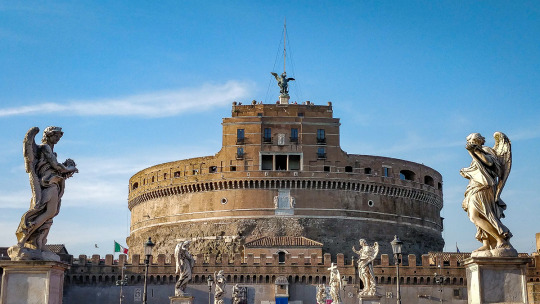
Castel Sant’Angelo, 2018
Recondita armonia [some fun trivia]
The tone of the dialogue was elevated quite a bit. Get this: comforting Cavaradossi after he was tortured, Tosca says ‘Ma il giusto Iddio lo punirá’ [‘But a just God will punish [Scarpia]’]. The initial line was ‘Ma il sozzo sbirro lo pagherà’ [‘But the filthy cop will pay for it’]. Far less distinguished, my dear.
Puccini visited Rome specifically to mimic the early morning bells. Kudos for authenticity. Also, initially, the composer spent an ungodly amount of money to cast the bells he needed for the performance of ‘Tosca’. The orchestras till today have difficulties satisfying the composer’s vision.
Sarah Bernhardt, an actress who became the prototype for Tosca in Sardou’s play, while performing in Rio de Janeiro in 1905, injured her leg in the final scene when jumping from the rampart. As a result of poor treatment, she lost her leg ten years later. Gory.
Two of the most famous opera singers chose this opera as their farewell: Maria Callas as Tosca gave her last performance in 1965, and Luciano Pavarotti as Mario Cavaradossi in 2004.
In one of the performances with Placido Domingo as Mario Cavaradossi, his son was featured as a shepherd boy.
Before Puccini got to write ‘Tosca’, Giuseppe Verdi expressed his interest. He didn’t like the ending though and wanted it changed - I think we’ve barely avoided another ‘La Traviata’ there, oof.
Oscar Wilde saw ‘La Tosca’ and believed the torture scene was great as it showed how far people can go (no wonder; he was working on ‘Salome’ that evoked indignant discontent of the critics in a similar fashion). George Bernard Shaw also saw the play and, while disliking it utterly, still predicted it would be great as an opera.
In Sardou’s play, Cavaradossi gained a reputation of a Bonapartist in large part because of his mustache. That’s the conclusion I’ve made after seeing these two quotes: ‘Even his mustache was suspect’ and ‘Tosca’s confessor told her it marked him as a revolutionary’. This is gold.
#opera#puccini#tosca#IMHO#why criticism#lots of rambling#greatest opera ever#i don't understand why critics abuse it
8 notes
·
View notes
Text
exo as classical composers
i love my new music boys and i love my original music boys. why not mash them together?
minseok: schubert. i mean their names evens sound alike. schubert, xiumin. anyways. wasn't a prodigy. not from the start. but he put himself into training. true to himself and his work. simple, subtle musicality.
junmyeon: verdi. a natural born leader. keeps to himself at times for the sake of the others. extremely compassionate and is the one to console the boys. has a mind for responsibility. warm, protective, understanding. works so hard to be his best.
yixing: handel. humble as can be. literally paid for his own funeral. is just doing his own thing out here and travelling the world. he's admirable and lets us see him emotions. however, it doesn't get in the way of his work and his ambitions. generous.
baekhyun: berlioz. eccentric and very original. has his own creative ideas. baek tends to wear his emotions on his sleeve. can be impulsive. has a keen sense for imaginative musicality. sometimes you see him quick to anger, and his bitterness is evident. but our boy is also very witty.
jongdae: vivaldi. so friendly and charitable. he's got a good head on his shoulders and a matching heart in his chest. he understands people. his work is very technical, but is also sensitive and perceptive.
chanyeol: mozart. social butterfly who thrives off creation. challenges the standards by pushing the limits. a true artist. multitalented musical prodigy. rambunctious w a childish humor. charming but has a slight air of arrogance at times? like a jock, you know?
kyungsoo: liszt. well-mannered. rose to fame quickly (ever heard of lisztomania?). he is truly musical. passionate about what he does. he is good and he knows it. seriously though. everyone loves him. could probably have anyone he wants.
jongin: bruckner. a huge personality onstage, with hot dancing and fiery moves. but he is really timid and pure. in short: kai onstage, jongin off. very self-aware and eternally curious. has really produced work of emotion and sensitivity.
sehun: bach. took time to get the recognition he deserved. beloved by everyone. puts everything into his work and expects it from others as well. so dedicated. if you screw him he screws you. petty. (nah im kidding i love sehun he is a great guy.)
also considered: jongin as dvorak, baekhyun as mozart, yixing as brahms or copland, chanyeol as haydn, junmyeon as chopin or schoenberg, kyungsoo as wagner.
i don't get the underappreciation for baroque, classical, romantic, 20th century music. the foundation of everything we have come to know. the opera, the orchestra!! it's all very exciting, and it's sad many today don't see that.
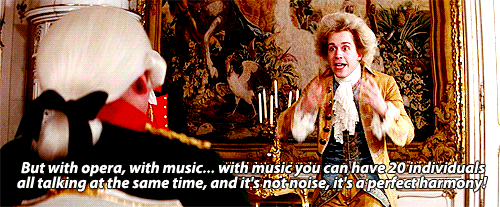
4 notes
·
View notes
Note
sorry if this is weird and random but do u know any good books with lesbian characters? u just seem like the type of person who would
First of all, can I just say I’m thrilled that i give off that impression? Clearly, I’m doing something right. Second, yes! I do! Not as many as I’d like, but still (also, I’m including bi girls because it does widen the the selection a little.)
Adaption by Malinda Lo
Reese can’t remember anything from the time between the accident and the day she woke up almost a month later. She only knows one thing: She’s different now.
Across North America, flocks of birds hurl themselves into airplanes, causing at least a dozen to crash. Thousands of people die. Fearing terrorism, the United States government grounds all flights, and millions of travelers are stranded.
Reese and her debate team partner and longtime crush David are in Arizona when it happens. Everyone knows the world will never be the same. On their drive home to San Francisco, along a stretch of empty highway at night in the middle of Nevada, a bird flies into their headlights. The car flips over. When they wake up in a military hospital, the doctor won’t tell them what happened, where they are—or how they’ve been miraculously healed.
Things become even stranger when Reese returns home. San Francisco feels like a different place with police enforcing curfew, hazmat teams collecting dead birds, and a strange presence that seems to be following her. When Reese unexpectedly collides with the beautiful Amber Gray, her search for the truth is forced in an entirely new direction—and threatens to expose a vast global conspiracy that the government has worked for decades to keep secret.
they’re sci-fi YA novels with a bi main character and they’re really fun!! There is a love triangle, but it’s resolved super well in the sequel, Inheritance. I promise even if you hate love triangles (I do) just stick it. I don’t want to spoil anything but like… trust me.
The Summer I Wasn’t Me by Jessica Verdi
She never meant for her mom to find out. And now she’s afraid that what’s left of her family is going to fall apart for good.
Lexi knows she can fix everything. She can change. She can learn to like boys. New Horizons summer camp has promised to transform her life, and there’s nothing she wants more than to start over.
But sometimes love has its own path…
This is just about the only realistic fiction/coming out story on here— I’m usually not a huge fan. But I read this when I was younger and first coming to terms with my sexuality so it gets a spot.
Ash by Malinda Lo
In the wake of her father’s death, Ash is left at the mercy of her cruel stepmother. Consumed with grief, her only joy comes by the light of the dying hearth fire, rereading the fairy tales her mother once told her. In her dreams, someday the fairies will steal her away, as they are said to do. When she meets the dark and dangerous fairy Sidhean, she believes that her wish may be granted.
The day that Ash meets Kaisa, the King’s Huntress, her heart begins to change. Instead of chasing fairies, Ash learns to hunt with Kaisa. Though their friendship is as delicate as a new bloom, it reawakens Ash’s capacity for love-and her desire to live. But Sidhean has already claimed Ash for his own, and she must make a choice between fairy tale dreams and true love.
Entrancing, empowering, and romantic, Ash is about the connection between life and love, and solitude and death, where transformation can come from even the deepest grief.
Have you ever wondered what Cinderella would be like if it were gay and had proper faeries? Wonder no more; Ash is the book for you! Seriously though, Lo is a godsend when it comes to queer si-fi/fantasy YA fiction. She has a couple more books that I haven’t read yet but look just as good.
And I Darken by Kiersten White
No one expects a princess to be brutal. And Lada Dragwlya likes it that way. Ever since she and her gentle younger brother, Radu, were wrenched from their homeland of Wallachia and abandoned by their father to be raised in the Ottoman courts, Lada has known that being ruthless is the key to survival. She and Radu are doomed to act as pawns in a vicious game, an unseen sword hovering over their every move. For the lineage that makes them special also makes them targets.
Lada despises the Ottomans and bides her time, planning her vengeance for the day when she can return to Wallachia and claim her birthright. Radu longs only for a place where he feels safe. And when they meet Mehmed, the defiant and lonely son of the sultan, Radu feels that he’s made a true friend—and Lada wonders if she’s finally found someone worthy of her passion.
But Mehmed is heir to the very empire that Lada has sworn to fight against—and that Radu now considers home. Together, Lada, Radu, and Mehmed form a toxic triangle that strains the bonds of love and loyalty to the breaking point.
Okay so… technically, this one probably doesn’t really belong on this list but like. Guys. It’s so good. And there are lesbians, they’re just not quite main characters, and there’s other queer characters who have larger parts. It’s based on the stories of Vlad the Impaler, re-imagined if he were a woman. The pov characters are Lada (Vlad) and her brother Radu, and I love them, and their messy ass relationship, both so much. It’s all set in the royal court of the ottoman empire, in the midst of the crusades, and there’s so much about fascinating political-religious tensions, and it’s historical fiction (queer historical fiction!!! (queer historical fiction not set in Western Europe!!!)). The sequel is Now I Rise, and features the lesbians more heavily.
The Dark Wife by Sarah Diemer
Three thousand years ago, a god told a lie. Now, only a goddess can tell the truth. Persephone has everything a daughter of Zeus could want–except for freedom. She lives on the green earth with her mother, Demeter, growing up beneath the ever-watchful eyes of the gods and goddesses on Mount Olympus. But when Persephone meets the enigmatic Hades, she experiences something new: choice. Zeus calls Hades “lord” of the dead as a joke. In truth, Hades is the goddess of the underworld, and no friend of Zeus. She offers Persephone sanctuary in her land of the dead, so the young goddess may escape her Olympian destiny. But Persephone finds more than freedom in the underworld. She finds love, and herself.
Have you ever thought Ancient Greek Myths were too heterosexual? Probably not, but now they’re even gayer! A re-imagining of Hades and Persephone where Hades is a woman. It’s a really quick read with a great love story and I highly recommend it.
Girls Made of Snow and Glass by Melissa Bashardoust
At sixteen, Mina’s mother is dead, her magician father is vicious, and her silent heart has never beat with love for anyone—has never beat at all, in fact, but she’d always thought that fact normal. She never guessed that her father cut out her heart and replaced it with one of glass. When she moves to Whitespring Castle and sees its king for the first time, Mina forms a plan: win the king’s heart with her beauty, become queen, and finally know love. The only catch is that she’ll have to become a stepmother.Fifteen-year-old Lynet looks just like her late mother, and one day she discovers why: a magician created her out of snow in the dead queen’s image, at her father’s order. But despite being the dead queen made flesh, Lynet would rather be like her fierce and regal stepmother, Mina. She gets her wish when her father makes Lynet queen of the southern territories, displacing Mina. Now Mina is starting to look at Lynet with something like hatred, and Lynet must decide what to do—and who to be—to win back the only mother she’s ever known…or else defeat her once and for all.Entwining the stories of both Lynet and Mina in the past and present, Girls Made of Snow and Glass traces the relationship of two young women doomed to be rivals from the start. Only one can win all, while the other must lose everything—unless both can find a way to reshape themselves and their story.
I am a sucker for a good adaption of myths and fairy tales, and this is probably my favorite. The plot, the concept… it’s so original and just absolutely delicious. The writing was good, if not the best I’ve ever read, but the characters were wonderful. Also, I picked it up without knowing it was gay, so I was very pleasantly surprised. Oh, but don’t worry– Mina and Lynet aren’t together, there’s no weird stepmother/daughter shit going on. They have separate love stories.
Fingersmith by Sarah Waters
Sue Trinder is an orphan, left as an infant in the care of Mrs. Sucksby, a “baby farmer,” who raised her with unusual tenderness, as if Sue were her own. Mrs. Sucksby’s household, with its fussy babies calmed with doses of gin, also hosts a transient family of petty thieves—fingersmiths—for whom this house in the heart of a mean London slum is home.
One day, the most beloved thief of all arrives—Gentleman, an elegant con man, who carries with him an enticing proposition for Sue: If she wins a position as the maid to Maud Lilly, a naïve gentlewoman, and aids Gentleman in her seduction, then they will all share in Maud’s vast inheritance. Once the inheritance is secured, Maud will be disposed of—passed off as mad, and made to live out the rest of her days in a lunatic asylum.
With dreams of paying back the kindness of her adopted family, Sue agrees to the plan. Once in, however, Sue begins to pity her helpless mark and care for Maud Lilly in unexpected ways…But no one and nothing is as it seems in this Dickensian novel of thrills and reversals.
Betrayal! Unbetrayal! Mutual betrayal! Mutual unbetrayal! It’s a wild fucking ride y'all. It also gets pretty fucking dark, but there’s a happy… enough ending, because I don’t do shit without happy endings.
Every Day, David Levithan
Every day a different body. Every day a different life. Every day in love with the same girl.There’s never any warning about where it will be or who it will be. A has made peace with that, even established guidelines by which to live: Never get too attached. Avoid being noticed. Do not interfere.It’s all fine until the morning that A wakes up in the body of Justin and meets Justin’s girlfriend, Rhiannon. From that moment, the rules by which A has been living no longer apply. Because finally A has found someone he wants to be with—day in, day out, day after day.
Eh, I debated whether to put this on here. As you can see, it’s about a kid who wakes up in a different body every day– be it guy or girl. From what I recall, “A” themself doesn’t every assign a gender to themself, and the book is in first person from their perspective, but the Goodreads description does use he/him pronouns. I read it as a non-binary/genderfluid person who falls in love with a girl, and it’s a really good book, so. Take it or leave it, it’s up to you. On an unrelated note, I think there’s a movie coming out soon.
That’s all I can think of at the moment! Hope you find something you like.
6 notes
·
View notes
Text
The Inconsistencies of Pig
Hey there readers! This is the 2nd part of my Kera Sakti rant. If you haven’t seen the first one, I heavily recommended you to read it here: http://smithanandari.tumblr.com/post/155676317158/my-kera-sakti-phase-is-back-again-no-surprise
So as I said in the previous part, this part will be talking much about The Pig’s character’s inconsistencies through the entire series of Kera Sakti (I and II. I refuse to acknowledge the existence of Kera Sakti III because it is not a sequel to TVB’s Journey to The West series. It’s Taiwanese production titled Monkey King: Quest for Sutra, for God’s sake). If you’ve seen the series, I believe you found it too! As fan of The Pig, I noticed a lot of character changes. Some might due to character building but some of them are just… off. It kinda started from the episodes of Spider Demon arc, and gets worse in the sequel (Kera Sakti II). Here’s my breakdown.
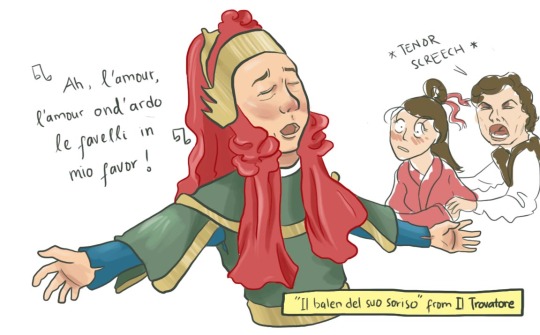
As for the start, I must be talking about episodes of The Pig’s early life. Here, the series creator makes a crazy (but damn good) move by altering what the original book provides (An officer who harass a heavenly deities then banished from heaven). They added this superb story: He was Heavenly Commander Tian Peng who has fallen deeply in love towards a beautiful celestial lady, called Chang Er, who has mutual love with other officer named Wu Kang instead. These episodes show Tian Peng as a much powerful man with lower-ranked rival having the love from his sunshine. It’s just like Count di Luna from opera Il Trovatore who has fiery love inside his body for beloved Leonora, who loves rebel Manrico instead. But interestingly, unlike di Luna, Commander Tian Peng doesn’t fight for his love openly to his rival Wu Kang. He tries backdoor ways to get her. The most notable one is where he turns back time several times to save her first but fails every time. Here’s this character’s comedic root shows up. I enjoy these awkward yet funny scenes so much. Knowing these acts, the heavenly emperor got furious and punish Tian Peng because heavenly deities are forbidden to love (and because basically he’s about to make a fucking Flashpoint). His punishment? The ultimate thousand of love tragedies!
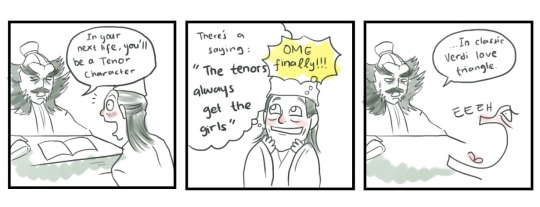
From low-ranked officer, to heavenly commander in charge of 80,000 navy soldiers, to a mere human who keeps getting trouble from love. That is the next part of the series about. The series shows audience some of >500 life he has lived during the punishment, for example a story where he’s a high commander who falls deeply in love with princess from enemy’s country he’s been fighting in war. He then sentenced to death for treason, just like Captain Radamès in Aida (wait, is this series’ script writer a fan of Giuseppe Verdi?) At a point he accidentally reincarnated to the wrong realm and ended up being unsightly humanoid pig who somehow still having heartbreak stories (Goddamnit Yue Lau). My personal favourite is the day he parted ways with his wife back in Gao Village before starting the journey with Tan San Zang. He has a poem (I’ve read from another source that this poem belongs to Chinese poet Li Bai) that he likes to recite at the end of each tragedies:
“多情自古空餘恨 (Duōqíng zìgǔ kòngyú hèn)
此恨綿綿無絕期 (cǐ hèn miánmián wú jué qī) ”
Or in English (from JTTW’s English Hardsub):
“I am overwhelmed by love in emptiness and resentment condition.
I only resend all these years that goes on without end.”
Or more famously known by Indonesian as “Sejak dulu beginilah cinta. Deritanya tiada akhir.”
(Thank you, Google Translate)
These scenes, despite being relatively small in running time in comparison to Wu Kong’s intro story, is powerful enough to show the audience the quality of Tian Peng/Ba Jie worth adored. Us, the audience, are served with dramatic ugly tears and painful feelings. From these, we see him as a hopeless romantic who lost everything he had just because he is too deep in love with someone! He might look funny at times (mind you, this is a comedy series) but the pain, God, the audience can feel the pain! Maybe this is why I found some of these scenes disturbing when I was a kid. I was expecting fun stuff from comedy series, but is served with a man showing his agony. But as a young adult, damn, I find it as some of the best moments from the series.
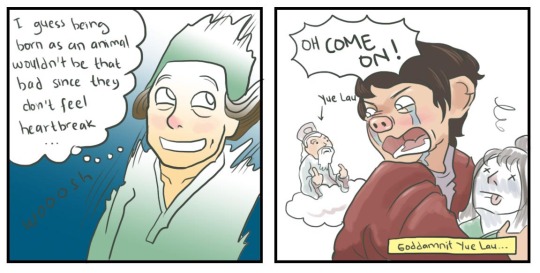
Then the scriptwriter(s) goes confused. In the Red Boy-Dream Demon duo arc, they made The Pig as a major pervert! He does some sexual harassment (for sake of comedy) instead of just looking at ladies in gently manner (and flapping ears, hahahaha). Maybe it’s because the borderline between ladies man and pervert is kind of hazy. In this arc he puts himself as a coward, but would sacrifice himself for his master. He has a small fighting scene (which will be never seen again, sigh…), is cunning (even though not all of his ideas work in solving the problems), and at times, helpful. He also in good terms with Wu Kong, even though Wu Kong plays him a little.
In the White Skeleton Spirit arc, he kind of had enough with Wu Kong and San Zang and then decided to be a dick towards them. He fights poorly (Ow come on! He was a commander back in the day, ffs!) but here, we can see him again becoming a gentle hopeless romantic lad, who in the end gets another agonizing heartbreak. There’s this inconsistency worth mentioned: In the earlier episodes, Ba Jie tends to use a disguise when interacting with ordinary people, so we can conclude that he’s not really confident with his physical appearance. (A bold move from the series creator since Book Ba Jie is SO DAMN CONFIDENT with his ugly-ass face). But in some scenes he doesn’t really mind facing the public without disguise, then back again being shy by insisting to his master to let him show himself as a well-dressed scholar (which the master refuses). There are lots of scenes in this arc showing Ba Jie uses veil to cover himself. But after the resolution of the arc, it is shown that he throws away his veil, accepting the fact about his looks. This scene tries its best to justify this particular inconsistency.
The small arc of Three Taoist doesn’t say much. Just showing him as a show-off and his dynamic with fellow disciples. Fun episodes, though. The Spider Demon arc is not really my favorite. It’s draggy and doesn’t do much with the pilgrim’s dynamic. It focuses on the Spider Demons’ own problem instead. There’s some development of The Pig, though. He still is looking at beauties but tries his best to look away. But really, there’s nothing in this arc. The Women Country arc is kind of a bummer to the Pig’s character too. He’s shown as a one dimensional character. Egotistical, that’s it. These episodes supposed to be able to show the dynamics of four characters but I just saw it as a random mess caused by babies. It ended the series with confusion.
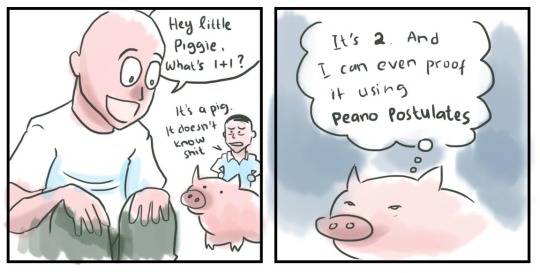
Now where it goes far down, The Kera Sakti II series. BY GOD it has the funniest moments, but has none of the character complexity of its predecessor. I laughed my ass off watching some scenes but really, I feel empty watching it. Despite its fun dynamics between the four pilgrims, almost all of the arc is draggy (especially you, yes, I’m looking at you, Tung Bei Monkey arc). I don’t know whether or not the production changed the entire writer and/or director because The Pig character is just shown as a mere clown of the series. He’s not cunning, he’s plain stupid! He’s obscene, dim-witted, a poorly-skilled fighter, and whiny baby. It’s REALLY different from the previous rendition, even though it’s played by same actor (well, this concludes that Wayne Lai is a volatile actor *clapping hands confusedly*) Hell, even there’s a scene where he says “Well, how do I supposed to know, I’m just a pig.” WHAT IN THE HELL WAS THAT? I hate this character. I know he’s funny af (so many funny scenes of him!) but that is not how The Pig is presented in the previous series. The presentation that made me fell for him (Sighs…) I think what happened in Kera Sakti II is, the series creator tried to adjust Ba Jie’s character towards its original (book) because the love tragedies never really happened again on him in this sequel and the famous poem becomes a mere tagline.
So that’s about it. From this post you kinda get the inconsistencies of the most humane character in Kera Sakti throughout the series. Maybe it’s just me being picky on things but it’s just my two cents (with this long-ass writing I should say four dollars). Has any of you thought the same? Or maybe you found other kinds of inconsistencies throughout the series? I would like to know and believe me, I like reading long-ass article!
Nevertheless, this Kera Sakti series is timeless. I’m about to re-watch some of it right now!
#kera sakti#indonesia#tv serials#tvb#journey to the west#zhu bajie#wayne lai#review#love triangle#midnight thoughts
9 notes
·
View notes